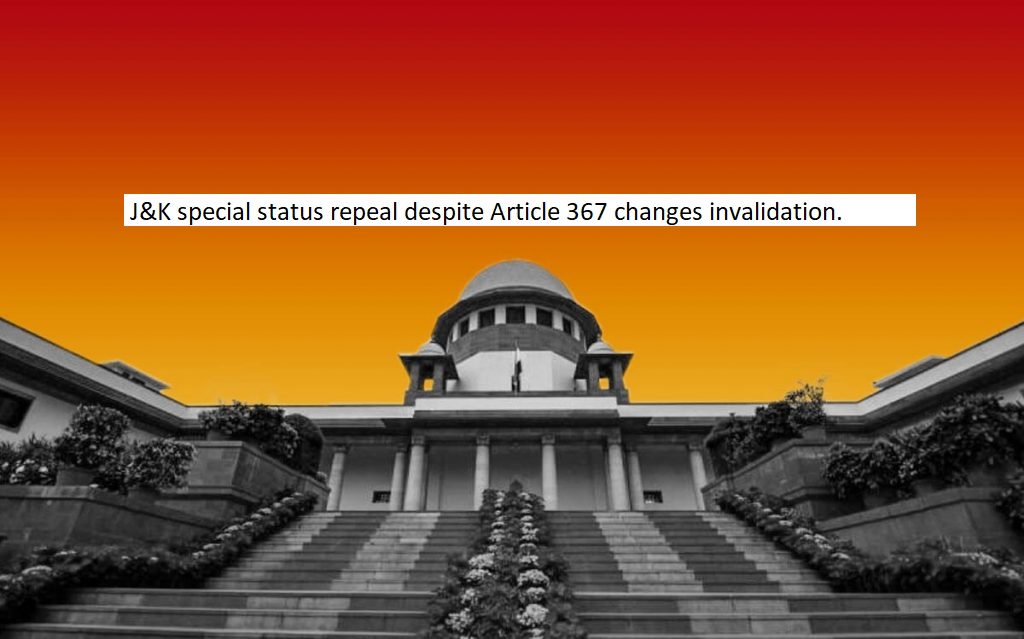


In a landmark judgment, a Constitution Bench of the Supreme Court recently validated the Union Government's 2019 decision to revoke the special status of Jammu and Kashmir (J&K) under Article 370 of the Constitution. The bench, comprising Chief Justice DY Chandrachud and Justices Sanjay Kishan Kaul, Sanjiv Khanna, BR Gavai, and Surya Kant, ruled on the constitutional intricacies surrounding the repeal.
The central issue involved the Constitution (Application to Jammu & Kashmir) Order, 2019 (CO 272), which modified Article 370(3) through an amendment to Article 367. The court found that while CO 272 was ultra vires in altering Article 370(3), the declaration applying all provisions of the Constitution to J&K under CO 272 remained valid, as the collaboration of the State Government wasn't a prerequisite.
The legal context stems from Article 370(3), granting the President the authority to declare the cessation of Article 370, requiring a recommendation from the J&K Constituent Assembly. However, since the Assembly dissolved in 1957, CO 272 was enacted, altering Article 367 to equate "Constituent Assembly" with "Legislative Assembly." This allowed the Parliament's recommendation to substitute for the nonexistent Legislative Assembly's concurrence.
The court emphasized that the alteration to Article 367, ostensibly a mere interpretation, effectively amended Article 370. It argued that changing "Constituent Assembly" to "Legislative Assembly" affected the recommending body and introduced a new arrangement not envisioned by the original Constituent Assembly.
The judgment, authored by CJI DY Chandrachud, stressed the constitutional distinction between a Constituent Assembly and a Legislative Assembly. It argued that the latter lacked the power to amend the Constitution, making it distinct from the constituent power vested in a Constituent Assembly.
The court condemned using an interpretation clause to amend the Constitution, cautioning against evading the prescribed Article 368 amendment process. It highlighted the risk of rendering multiple constitutional provisions susceptible to amendment without adherence to due procedure.
Regarding CO 272, the court clarified that the President consulting the Union Government instead of the State Government wasn't invalid. It reasoned that obtaining the State Government's concurrence wasn't necessary for applying the Constitution to J&K, as per Article 370(1)(d).
The court scrutinized the mala fide aspect, asserting that deception required an intent to deceive. Since State Government concurrence wasn't obligatory under Article 370(1)(d), securing Union of India's concurrence wasn't mala fide.
The judgment underscored the President's unilateral power under Article 370(3) to declare the cessation of Article 370, unaffected by the Constituent Assembly's dissolution. It emphasized that determining "special circumstances" justifying Article 370's existence was a policy decision within the executive's purview.
Examining the historical context, the court noted the President's continuous exercise of power under Article 370(1)(d) over 70 years, indicating a gradual constitutional integration of J&K with the Union. It rejected the contention that Article 370(3) became redundant after the Constituent Assembly's dissolution, emphasizing the ongoing nature of constitutional integration.
In essence, the judgment upheld the constitutional validity of the revocation of J&K's special status, navigating intricate legal terrain. It established that while CO 272's amendment to Article 367 was flawed, the broader application of the Constitution to J&K remained legally sound, ensuring the constitutional integration of the region with the Union.
TAGS: Supreme Court Article 370 Jammu and Kashmir Constitution Bench Validity Repeal Constitutional intricacies CO 272